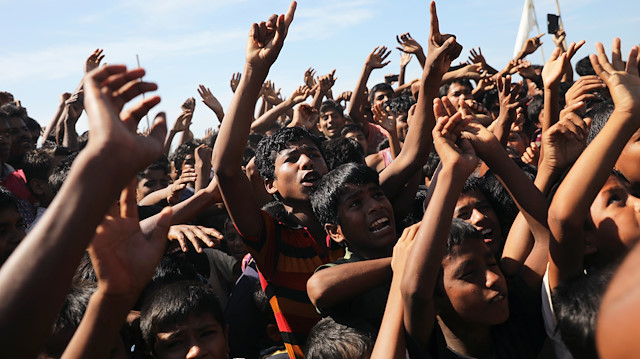
Government says it will continue talks with refugees in hopes to motivate them to willingly return to Myanmar
The Bangladeshi government on Thursday halted the first scheduled Rohingya repatriation to Myanmar following protests by the refugees.
Md Abul Kalam, commissioner of the Bangladesh Refugee Relief and Repatriation Commission, told Anadolu Agency that all preparations were complete from their side, but the Rohingya were not willing to return to their home country.
The formal process has not been suspended, he said, adding that the government will continue talks with the refugees in hopes to motivate them to willingly return.
Earlier on Thursday, Rohingya refugees staged a protest in Cox's Bazar city against the scheduled repatriation saying their lives are at risk in their native Rakhine state.
Troops have been deployed at the camps to prevent an outbreak of violence.
According to a joint agreement between the Myanmar and Bangladeshi government, repatriation of 2,200 refugees was to begin on Thursday.
However, rights groups, the UN and the U.S. have argued that the lives of the refugees in their home country are in danger.
The Rohingya, described by the UN as the world's most persecuted people, have faced heightened fears of attack since dozens were killed in communal violence in 2012.
Since Aug. 25, 2017, nearly 24,000 Rohingya Muslims have been killed by Myanmar’s state forces, according to a report by the Ontario International Development Agency (OIDA).
More than 34,000 Rohingya were also thrown into fires, while over 114,000 others were beaten, said the OIDA report, titled "Forced Migration of Rohingya: The Untold Experience."
Some 18,000 Rohingya women and girls were raped by Myanmar’s army and police and over 115,000 Rohingya homes were burned down and 113,000 others vandalized, it added.
According to Amnesty International, more than 750,000 Rohingya refugees, mostly children, and women, fled Myanmar and crossed into neighboring Bangladesh after Myanmar forces launched a crackdown on the minority Muslim community in August 2017.
The UN has documented mass gang rapes, killings -- including of infants and young children -- brutal beatings, and disappearances committed by Myanmar state forces. In a report, UN investigators said such violations may have constituted crimes against humanity.
Hello, the comments you share on our site are a valuable resource for other users. Please respect other users and different opinions. Do not use rude, offensive, derogatory, or discriminatory language.
The floor is all yours.








